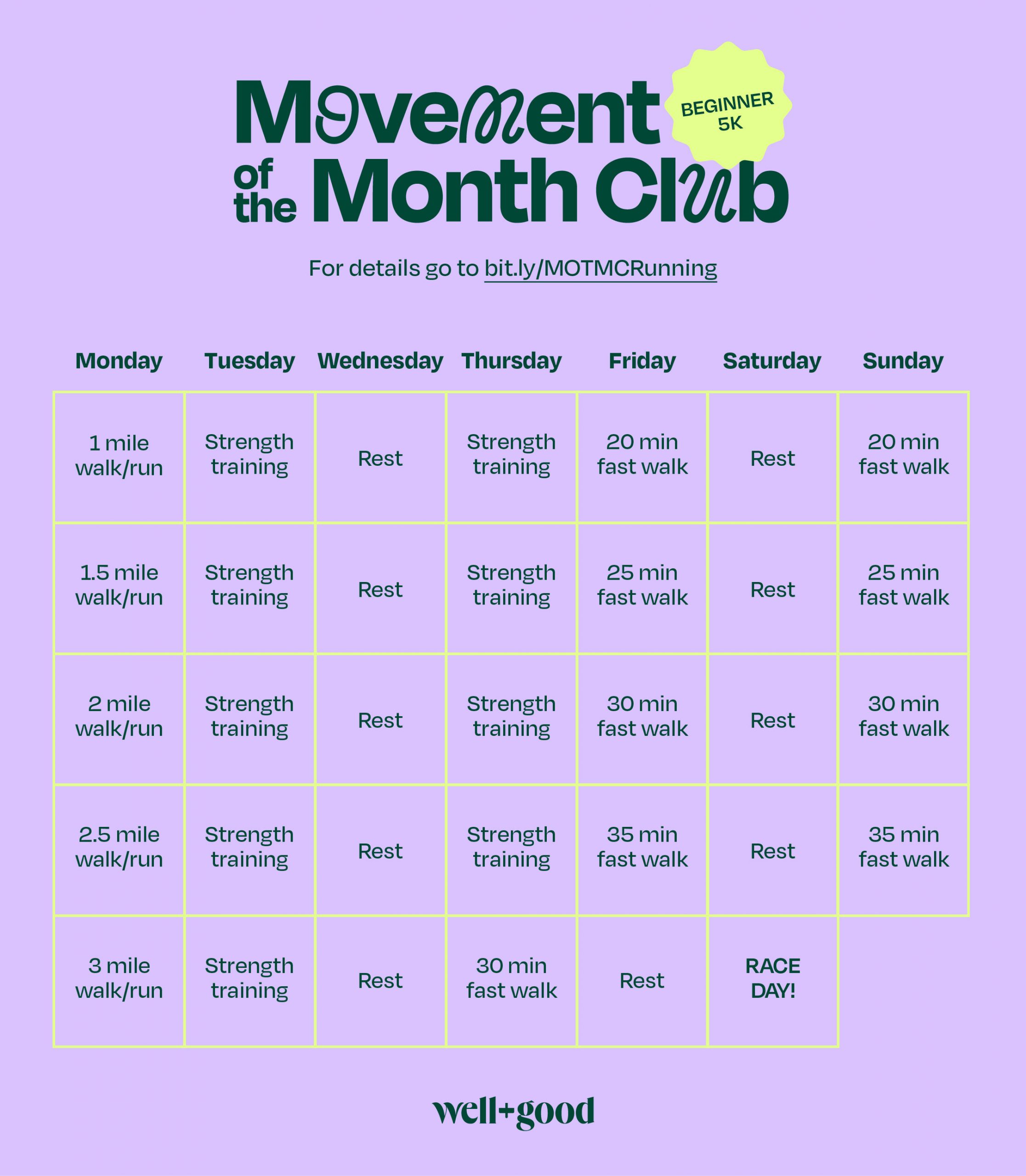Cross the Finish Line Healthy and Strong With This Beginner-Friendly 5-Week Training Plan
As the saying goes, you don’t have to be great to start, but you have to start to be great. Every runner begins somewhere, and there’s no better place than here, with our beginner 5K training plan that promises to transform—not just guide—your approach to running.
“Anyone and everyone can be a runner,” says Ciara Lucas, CPT, certified running coach and host of our September Movement of the Month Club running challenge. “If you’re a beginner, don’t worry about going fast or far. Forward is a pace!”
Start your journey to a successful 5K finish with our beginner 5K training plan, designed by Lucas, where progress meets performance every step of the way. (And if you want something a little more challenging, check out our intermediate 5K training plan.)
Don’t forget to register for a race! Find a 5K near you or sign up for a virtual 5K.
Here’s your beginner 5K training plan
With this run-walk program, you’ll find a friendly, accessible approach that gradually eases you into the world of running. “You’ll start with a combination of walking and jogging, build up your consistency, and it will start to feel easier the more you do it,” Lucas says.
As you lace up your running shoes, keep in mind few key techniques that can make your first 5K journey smoother and more enjoyable.
“Make sure you start off on the right foot (pun intended) and have shoes that aren’t worn down or falling apart,” Lucas says. “Check out your local running store to get properly fitted for a sneaker that works for your feet so you’re comfortable putting in the work.”
And don’t forget to start each session with a warmup to prepare your muscles and finish with a cooldown to start the recovery process.
Next, focus on your running form: Keep your posture straight and head lifted, eyes looking forward, not down. This alignment helps reduce strain on your neck and back and facilitates efficient breathing. Speaking of breathing, try to establish a rhythmic pattern—inhale for a few strides, then exhale for the same number.
It’s also extremely important to listen to your body. If you feel pain—not just fatigue—it’s important to stop and rest; pushing through pain can lead to injuries.
Don’t forget: “Give yourself plenty of grace, and don’t forget to have fun with it!” Lucas says.
Get a printer-friendly version of the calendar here.
To keep things simple and straightforward, you’ll do the same type of workout each day of the week (except for the two days leading up to race day):
Monday: run-walk
Tuesday: strength training
Wednesday: rest
Thursday: strength training
Friday: fast walk
Saturday: rest
Sunday: fast walk
For walk-run days, start with a 1- to 2-minute walking warmup, then alternate 45 seconds of running or jogging with 1 minute of walking until you reach the distance for that day. Make sure to end with a least 1 minute of walking to cool down.
You can always increase or decrease the amount of time you spend running, depending on your fitness level. You want to be challenged but not completely drained. As the distance increases each week, try to keep your running intervals the same duration or slightly longer!
On Tuesday and Thursday—your strength training days—you can either do your favorite body-weight or weight-lifting workout, or try one of these workouts from the Well+Good YouTube channel:
Strength Workout From a Mile High Run Club Trainer
15-Minute Glute Workout for Runners
Lower Body Workout to Boost Running Stability
15-Minute Core Workout for Runners
20-Minute Pilates Workout for Runners
The two days before race day, you’ll do one final 30-minute walk, followed by a rest day. You want your muscles to be recovered enough to give it your all on the course!
“This program is meant to give you structure and guidance—but it’s not the law,” Lucas says. “Do what works best for your schedule, lifestyle, and ability. Get a friend to join you so you can hold each other accountable, and then run the 5K together!”
